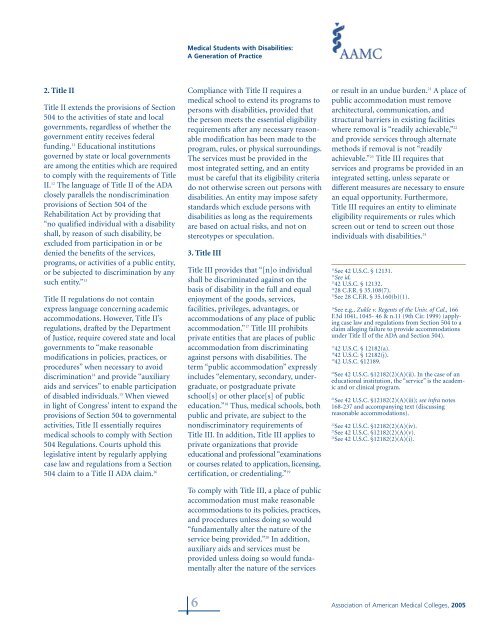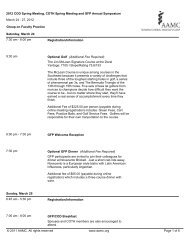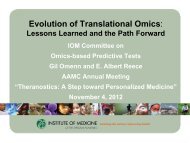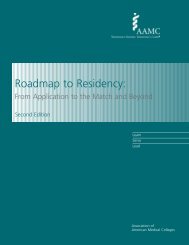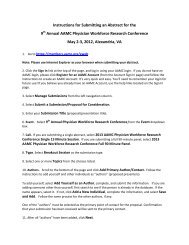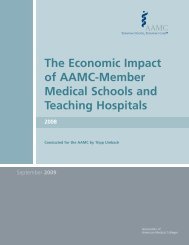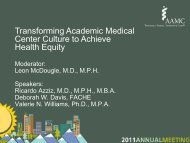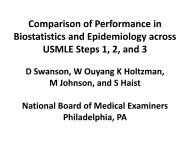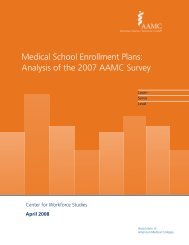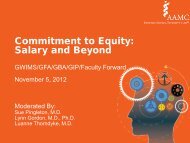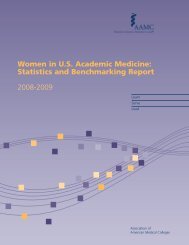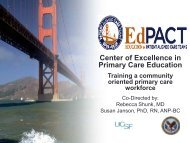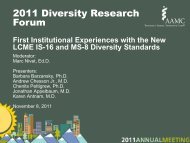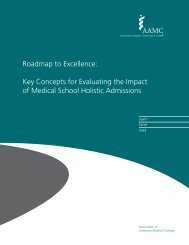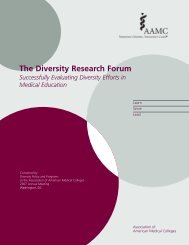Medical Students with Disabilities: A Generation of Practice
Medical Students with Disabilities: A Generation of Practice
Medical Students with Disabilities: A Generation of Practice
You also want an ePaper? Increase the reach of your titles
YUMPU automatically turns print PDFs into web optimized ePapers that Google loves.
<strong>Medical</strong> <strong>Students</strong> <strong>with</strong> <strong>Disabilities</strong>:<br />
A <strong>Generation</strong> <strong>of</strong> <strong>Practice</strong><br />
2. Title II<br />
Compliance <strong>with</strong> Title II requires a<br />
medical school to extend its programs to<br />
Title II extends the provisions <strong>of</strong> Section persons <strong>with</strong> disabilities, provided that<br />
504 to the activities <strong>of</strong> state and local the person meets the essential eligibility<br />
governments, regardless <strong>of</strong> whether the requirements after any necessary reasonable<br />
modification has been made to the<br />
government entity receives federal<br />
funding. 11 Educational institutions program, rules, or physical surroundings.<br />
governed by state or local governments The services must be provided in the<br />
are among the entities which are required most integrated setting, and an entity<br />
to comply <strong>with</strong> the requirements <strong>of</strong> Title must be careful that its eligibility criteria<br />
II. 12 The language <strong>of</strong> Title II <strong>of</strong> the ADA do not otherwise screen out persons <strong>with</strong><br />
closely parallels the nondiscrimination disabilities. An entity may impose safety<br />
provisions <strong>of</strong> Section 504 <strong>of</strong> the<br />
standards which exclude persons <strong>with</strong><br />
Rehabilitation Act by providing that disabilities as long as the requirements<br />
“no qualified individual <strong>with</strong> a disability are based on actual risks, and not on<br />
shall, by reason <strong>of</strong> such disability, be stereotypes or speculation.<br />
excluded from participation in or be<br />
denied the benefits <strong>of</strong> the services,<br />
3. Title III<br />
programs, or activities <strong>of</strong> a public entity,<br />
or be subjected to discrimination by any Title III provides that “[n]o individual<br />
such entity.” 13<br />
shall be discriminated against on the<br />
basis <strong>of</strong> disability in the full and equal<br />
Title II regulations do not contain enjoyment <strong>of</strong> the goods, services,<br />
express language concerning academic facilities, privileges, advantages, or<br />
accommodations. However, Title II’s accommodations <strong>of</strong> any place <strong>of</strong> public<br />
regulations, drafted by the Department accommodation.” 17 Title III prohibits<br />
<strong>of</strong> Justice, require covered state and local private entities that are places <strong>of</strong> public<br />
governments to “make reasonable accommodation from discriminating<br />
modifications in policies, practices, or against persons <strong>with</strong> disabilities. The<br />
procedures” when necessary to avoid term “public accommodation” expressly<br />
discrimination 14 and provide “auxiliary includes “elementary, secondary, undergraduate,<br />
or postgraduate private<br />
aids and services” to enable participation<br />
<strong>of</strong> disabled individuals. 15 When viewed school[s] or other place[s] <strong>of</strong> public<br />
in light <strong>of</strong> Congress’ intent to expand the education.” 18 Thus, medical schools, both<br />
provisions <strong>of</strong> Section 504 to governmental public and private, are subject to the<br />
activities, Title II essentially requires nondiscriminatory requirements <strong>of</strong><br />
medical schools to comply <strong>with</strong> Section Title III. In addition, Title III applies to<br />
504 Regulations. Courts uphold this private organizations that provide<br />
legislative intent by regularly applying educational and pr<strong>of</strong>essional “examinations<br />
case law and regulations from a Section or courses related to application, licensing,<br />
504 claim to a Title II ADA claim. 16 certification, or credentialing.” 19<br />
or result in an undue burden. 21 A place <strong>of</strong><br />
public accommodation must remove<br />
architectural, communication, and<br />
structural barriers in existing facilities<br />
where removal is “readily achievable,” 22<br />
and provide services through alternate<br />
methods if removal is not “readily<br />
achievable.” 23 Title III requires that<br />
services and programs be provided in an<br />
integrated setting, unless separate or<br />
different measures are necessary to ensure<br />
an equal opportunity. Furthermore,<br />
Title III requires an entity to eliminate<br />
eligibility requirements or rules which<br />
screen out or tend to screen out those<br />
individuals <strong>with</strong> disabilities. 24<br />
11<br />
See 42 U.S.C. § 12131.<br />
12<br />
See id.<br />
13<br />
42 U.S.C. § 12132.<br />
14<br />
28 C.F.R. § 35.108(7).<br />
15<br />
See 28 C.F.R. § 35.160(b)(1).<br />
16<br />
See e.g., Zukle v. Regents <strong>of</strong> the Univ. <strong>of</strong> Cal., 166<br />
F.3d 1041, 1045- 46 & n.11 (9th Cir. 1999) (applying<br />
case law and regulations from Section 504 to a<br />
claim alleging failure to provide accommodations<br />
under Title II <strong>of</strong> the ADA and Section 504).<br />
17<br />
42 U.S.C. § 12182(a).<br />
18<br />
42 U.S.C. § 12182(j).<br />
19<br />
42 U.S.C. §12189.<br />
20<br />
See 42 U.S.C. §12182(2)(A)(ii). In the case <strong>of</strong> an<br />
educational institution, the “service” is the academic<br />
and or clinical program.<br />
21<br />
See 42 U.S.C. §12182(2)(A)(iii); see infra notes<br />
168-237 and accompanying text (discussing<br />
reasonable accommodations).<br />
22<br />
See 42 U.S.C. §12182(2)(A)(iv).<br />
23<br />
See 42 U.S.C. §12182(2)(A)(v).<br />
24<br />
See 42 U.S.C. §12182(2)(A)(i).<br />
To comply <strong>with</strong> Title III, a place <strong>of</strong> public<br />
accommodation must make reasonable<br />
accommodations to its policies, practices,<br />
and procedures unless doing so would<br />
“fundamentally alter the nature <strong>of</strong> the<br />
service being provided.” 20 In addition,<br />
auxiliary aids and services must be<br />
provided unless doing so would fundamentally<br />
alter the nature <strong>of</strong> the services<br />
6 Association <strong>of</strong> American <strong>Medical</strong> Colleges, 2005


